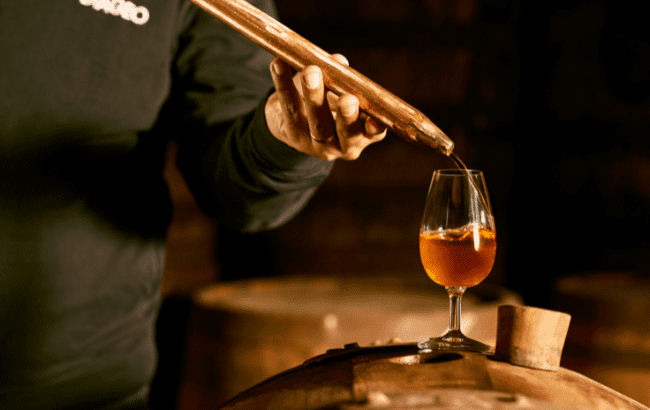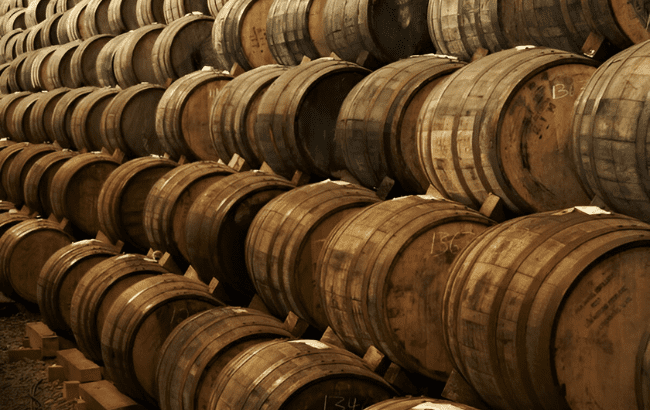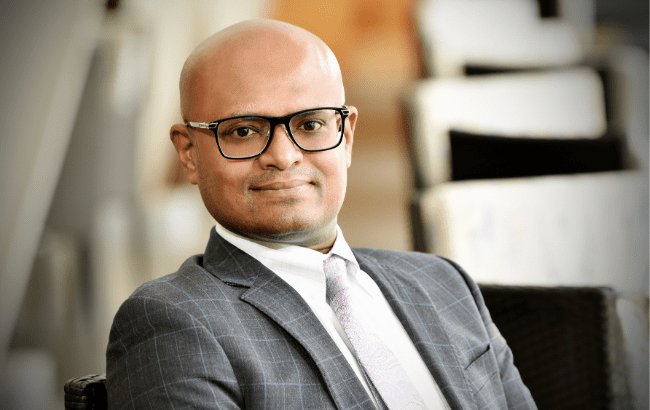Diageo: India Rare Spirits presents ‘infinite possibilities’
By Rupert HohwielerVikram Damodaran, chief innovation officer of Diageo India, gives SB a background briefing on the group’s India Rare Spirits programme and how the drinks giant intends to redefine cask ownership.

Having completed the first stage of its United Spirits acquisition more than 10 years ago now, Diageo has stepped up its intentions to premiumise its Indian subsidiary with the introduction of the India Rare Spirits cask programme.
Explaining the customised, invite-only cask programme to The Spirits Business, Vikram Damodaran, chief innovation officer of Diageo India, says the idea is “fundamentally to make hyper-localisation and hyper-personalisation the most important differentiating factors for a client when purchasing a cask of spirit”.
Infinite possibilities
The programme – exclusively for Diageo India’s private clients – is centred around personalisation, which Damodaran notes as the “new definition of luxury”.
He likens the process to buying a Lamborghini or a Ferrari, where buyers customise the cars to suit their own taste. “That’s exactly what they’re doing and what we’re now offering in the world of spirits,” he says. “And I think it is something that nobody else offers, to the best of my knowledge.”
Of how the process goes, if a client expresses interest, Diageo India will set up a personalised tasting session at its Ponda distillery in Goa with a number of rare and unseen brown spirits aged for more than eight years – whisky, brandy or rum. The client then picks the flavour they like, and Diageo goes back its its lab and works with the company’s scientists, who then return with a proposal.
The products come from 70 flavour blocks (what Damodaran refers to as the “secret sauce”), and from a liquid library of 20,000 casks that continues to grow as Diageo creates and invests in local spirits. The liquids within the library are matured for a minimum of 5-10 years. Its inventory includes Indian peated single malts finished in oloroso Sherry casks; ex-Bourbon and oloroso single malts; Champagne-finished single grains; Indian grape brandies aged in Sal wood vats; and dessert wine-finished single malts.
Damodaran says the proposal is based on what flavour block is chosen and what the scientists believe are the three or four flavour extensions that could suit the particular taste profile. This follows with a secondary tasting experience where the consumer decides their favourite flavour block and a spirit is then made for them from Diageo India’s inventory.
“We have infinite possibilities in terms of styles and in terms of sensory performance, and to the sheer delight of the consumer because they’re fundamentally creating something that is to their specific liking,” he says.

One-of-a-kind liquids
From here, the personalisation gets, well, more personal. As the conversation shifts to bottling and bottle structure, labelling, colours, corks and even engravings are chosen, as well as gifting solutions where Diageo India offers secondary packaging – a box that needs to be specially-designed to the consumer’s taste. Damodaran recalls that the programme recently sold a cask to a client with a bottle engraved with their family crest.
“For some, it’s a way to mark a wedding or an anniversary; for others, it’s an investment in something rare and beautiful. Whatever the purpose, each cask represents not just a spirit but a story,” he notes.
Damodaran adds that unlike most cask programmes, where people see a cask as an investment, with India Rare Spirits what you see is what you get, and what you design is what you get. What he means by this is that “today, with cask investment programmes or cask purchasing programmes, what’s normally offered is a catalogue of casks and a range of liquids, but you don’t really get to personalise the liquid to your own liking.
“India Rare Spirits is like buying a tailor-made suit. You pay for it, you design it, you customise it, and you pick it up when it’s ready. So we don’t hold inventory, we don’t promise a certain ageing programme. We fundamentally have a transparent conversation about the spirits that the clients are engaging with. Bottle it, package it and deliver it to them on purchase.
“The idea is to fundamentally create a proposition where hyper-personalisation was at the foundation of how you drive differentiation, built on extremely good liquids that could be designed to suit your particular taste preference.”
Damodaran continues that what Diageo has found with spirits connoisseurs, when going higher and higher up the ladder of aspiration and discernment, is that they “tend to want even more personalisation, and hyper personalisation, that gives them the ultimate flexibility to create something that’s almost their own”.
Price no longer sole indication of luxury
Damodaran explains Diageo India is veering away from price point as its sole marker of luxury and is looking to offer more in the pursuit of experiences.
Citing three fundamental points as to how luxury looks for its high-net-worth clients, he continues that the clients “look for objects that are a manifestation of themselves” (such as luxury cars). Secondly, they value “end-to-end experiences, so when buying into a brand, they’re also buying into an experience – they want to be affiliated with an experience that’s an invite only, that’s bespoke, that’s customised for them and appeals to their sensibilities.”
And last but not the least, Damodaran says luxury is also not just about owning something of value but “about being able to stand for something, that it speaks about something, and really is a manifestation of who you are as an individual”.
This is the “new definition of luxury” in India, Damodaran notes, of which the luxury market is expanding.
Interestingly, though, he stresses the programme isn’t meant just for the local consumer, even if it’s created in India.
“This is not a product that screams luxury,” he adds. “It’s very quiet in its softening because it’s also an invite-only model. It’s a private-client model, a model where people with bespoke tastes share the knowledge with other people with bespoke tastes.”

Establishing credibility for premium Indian spirits
After taking its initial stake in United Spirits, Diageo’s mandate in India was to move away from products at the bottom of the price pyramid, and instead launch and focus the attention on Indian spirits at the top end, such as Godawan, a single malt from Rajasthan.
In the three-and-a-half years since Godawan’s launch, the whisky is now available in eight countries and has garnered the advocacy and recognition Diageo aimed for in regards to how premium Indian whisky is perceived globally. This is not just in the liquid, but also in the packaging and principles behind the brand, Damodaran says.
Taking learnings from Godawan, the India Rare Spirits programme is accelerating this premium strategy and bringing Indian rare spirits to a “global audience”, he notes, while also celebrating the nation.
Diageo’s business in India has the largest footprint of distilleries spread across the nation, giving it access to multiple micro-climates, different ingredients and different temperatures. These are aggregated into the 20,000-strong barrel inventory. As a result, Damodaran says the programme presents its discerning clients with “an alternate reality of possibilities” and a range where “native craft explorations can bring out styles that haven’t existed before, which is what makes this entire conversation very interesting”.
India’s hot and humid climate negates its ability to produce high age statement whiskies like Scotland’s distilleries, as the temperature means ageing happens four times as fast. However, the climate and India being “an agrarian economy by and large”, also allow for unique signature styles. It’s a region Damodaran says “offers immense diversity in terms of terroir that translates into a world of craftsmanship helping consumers and clients discover different styles for every different offering”.
Considering many of the programme’s clients have already invested in casks in Scotland and Japan, to establish credibility in its India Rare Spirits tasting experience, Diageo also offers blind samples of ‘beautiful whiskies’ from Scotland and Japan. Damodaran explains this is because “when you do that tasting session, and when they’re not able to differentiate which one is from where, that fundamentally creates a switch in people’s minds to say, ‘wow, if this is the extent of possibility coming from India, then I’m willing to invest my time more than anything else’.
“They think ‘money is a consequence, but I’m investing my time in creating something that I love’, and I think that’s essentially the switch that we’re trying to make.”
And of the last question, how might one possibly get an invite to the programme?
“India Rare Spirits is for those who appreciate the exquisite art and craft of whisky making, recognise the intricate rarity, and understand that some invitations don’t need asking for, they arrive, like a perfectly aged malt, in their own time,” adds Damodaran. “As owning a bespoke cask isn’t just about possession – it’s about a personal connection to something timeless.
“If you know, you know.”
Related news
Pernod stays silent on Indian IPO rumour
Are Indian investors waking up to the power of the on-trade?
